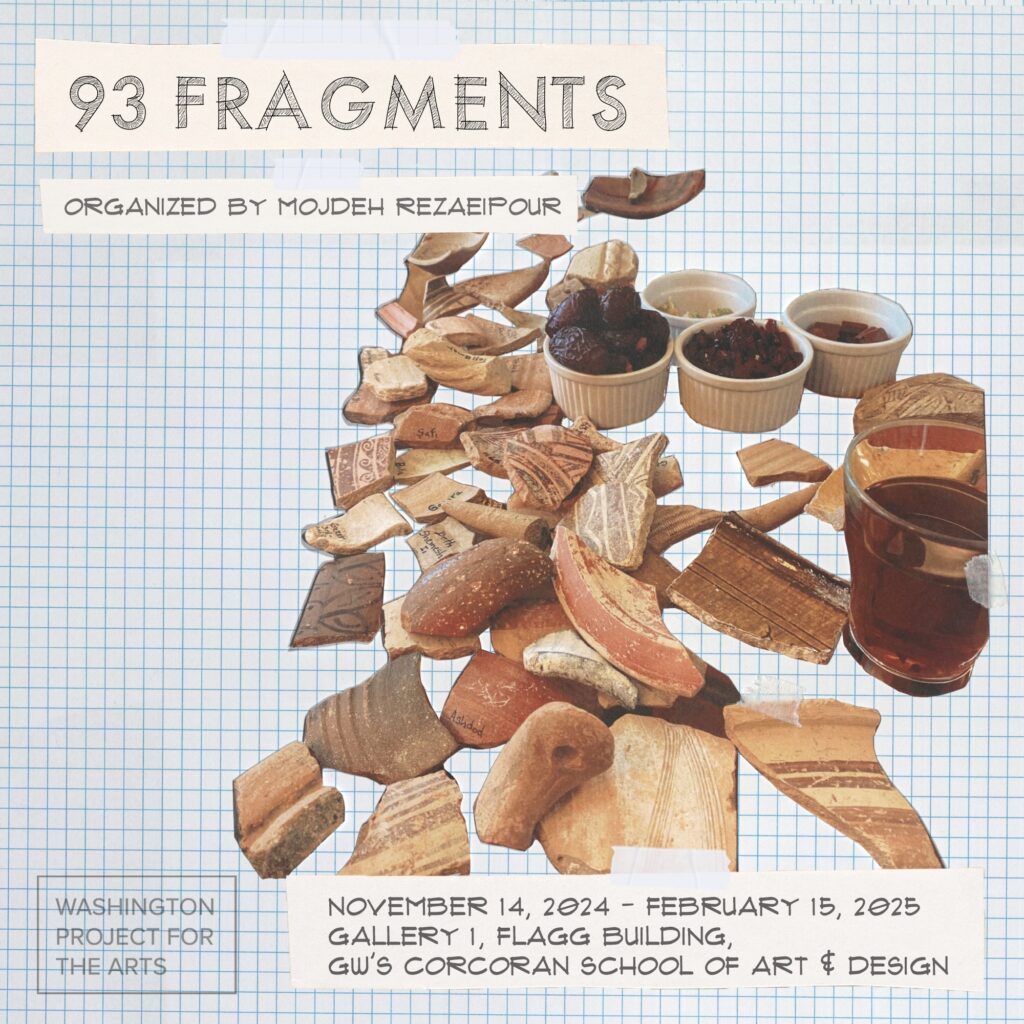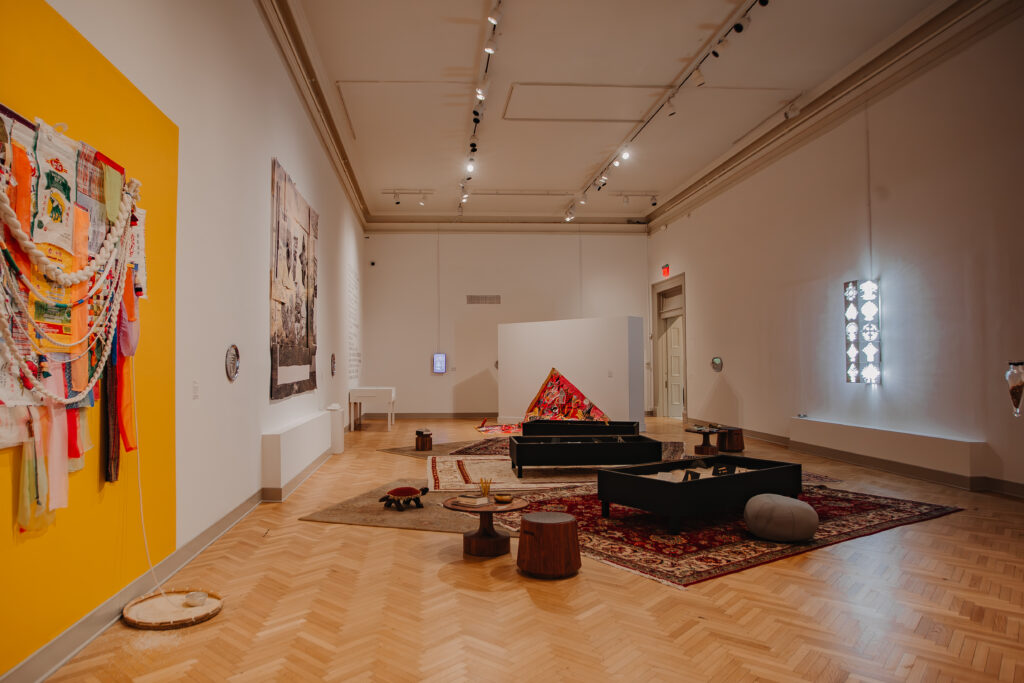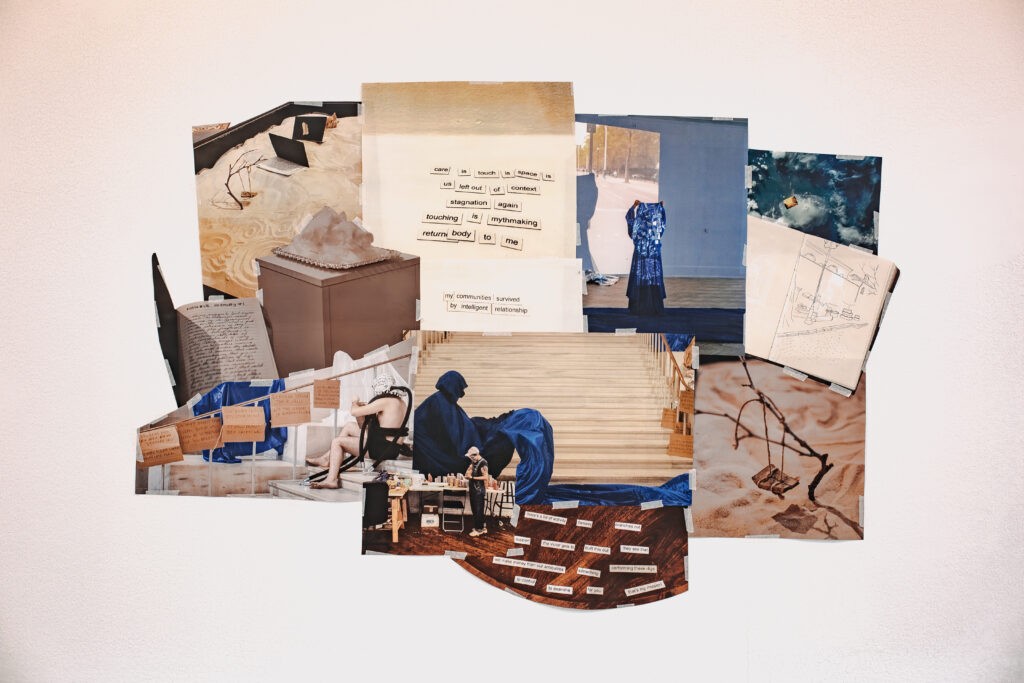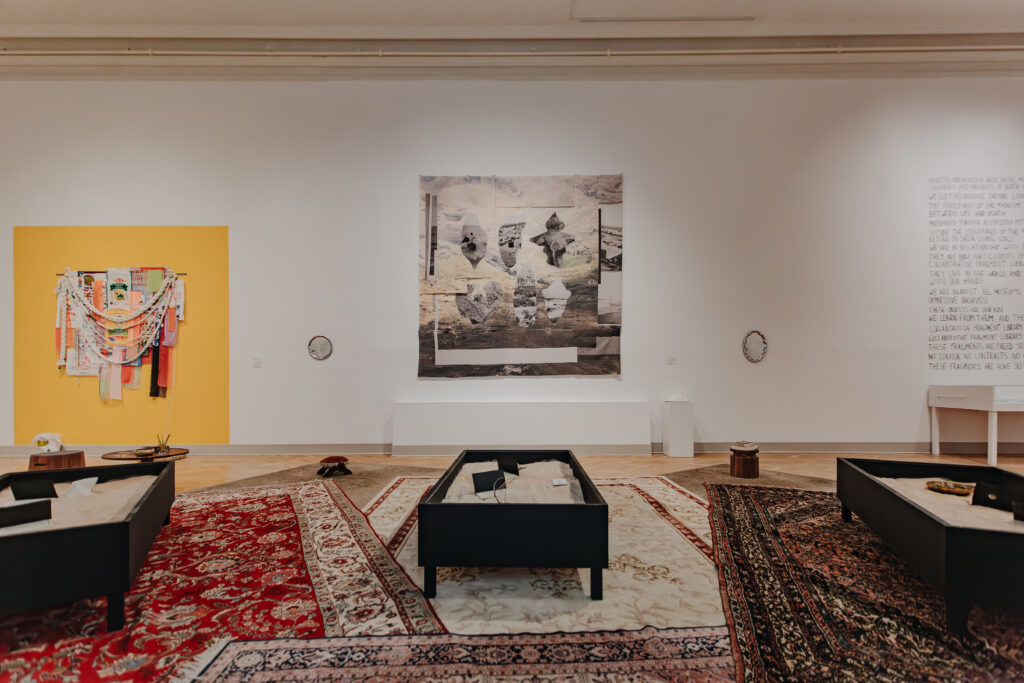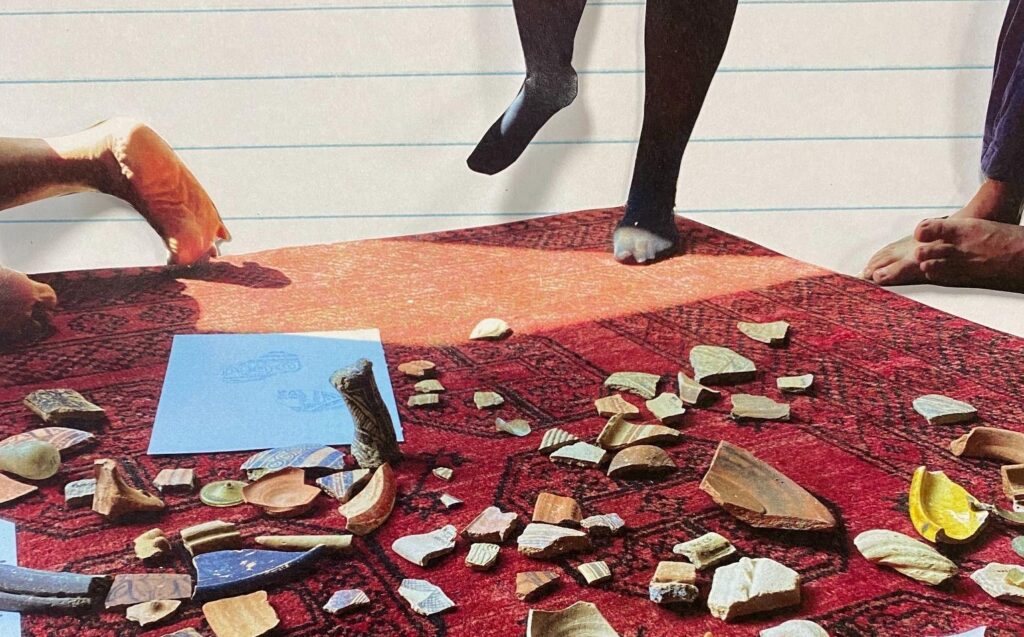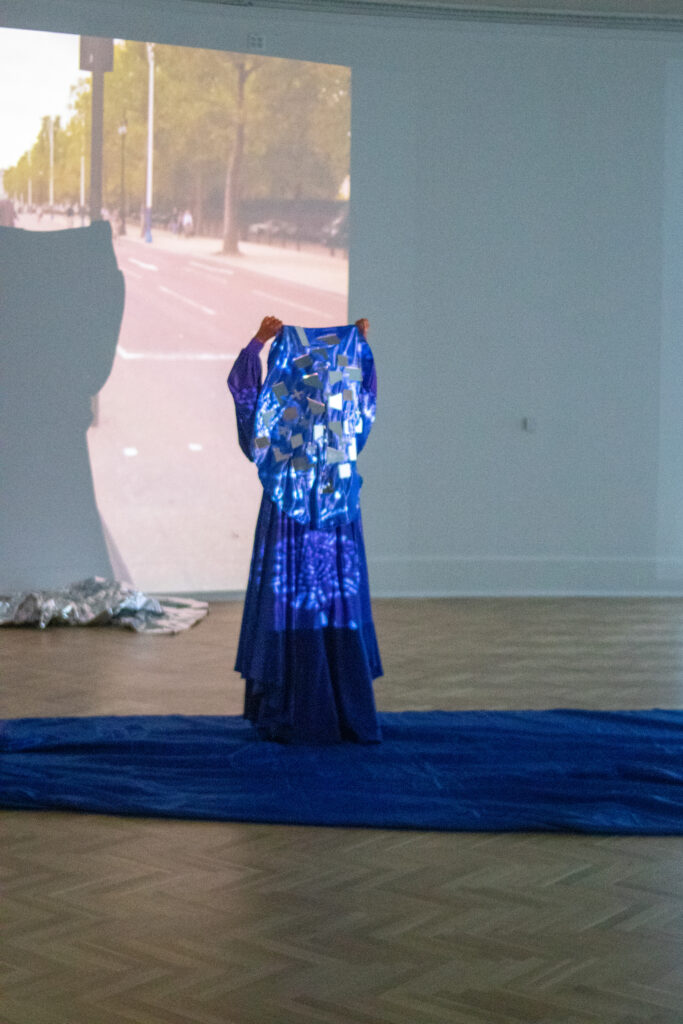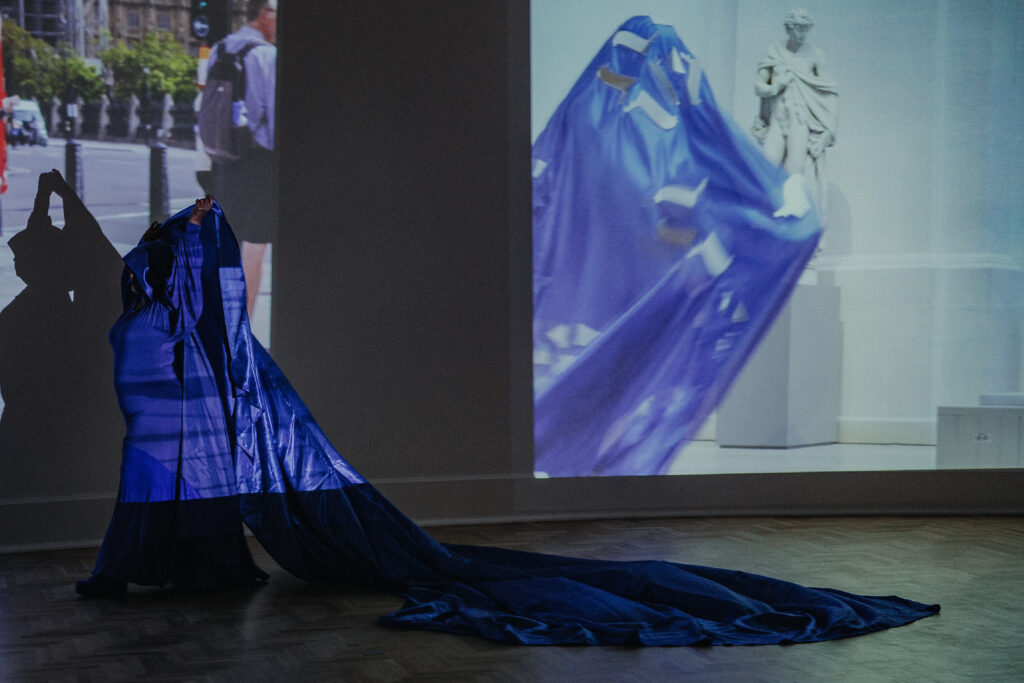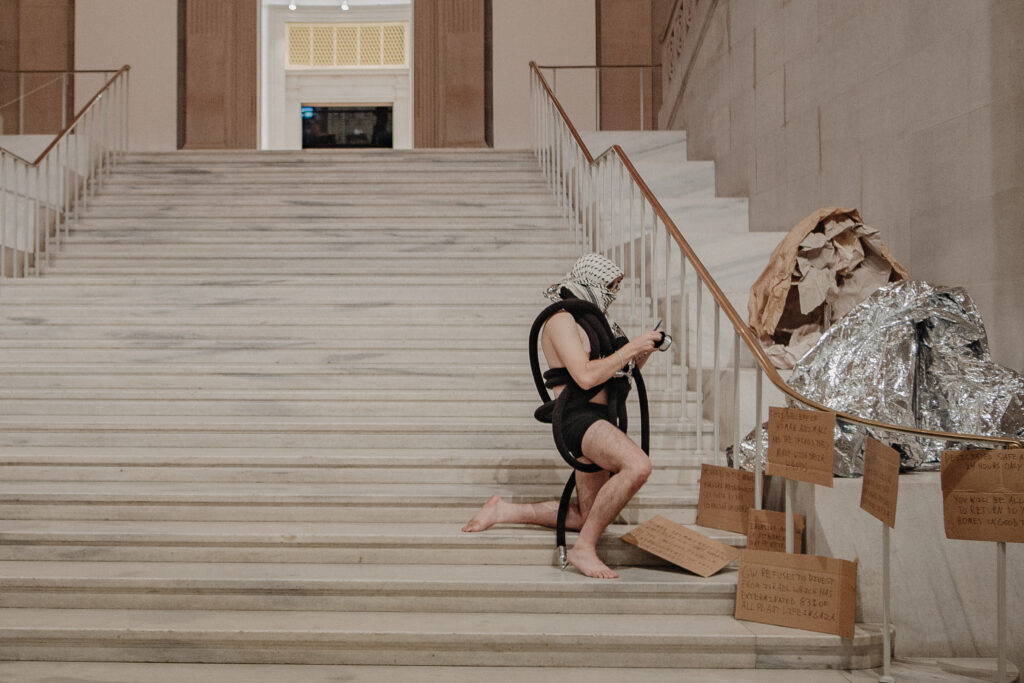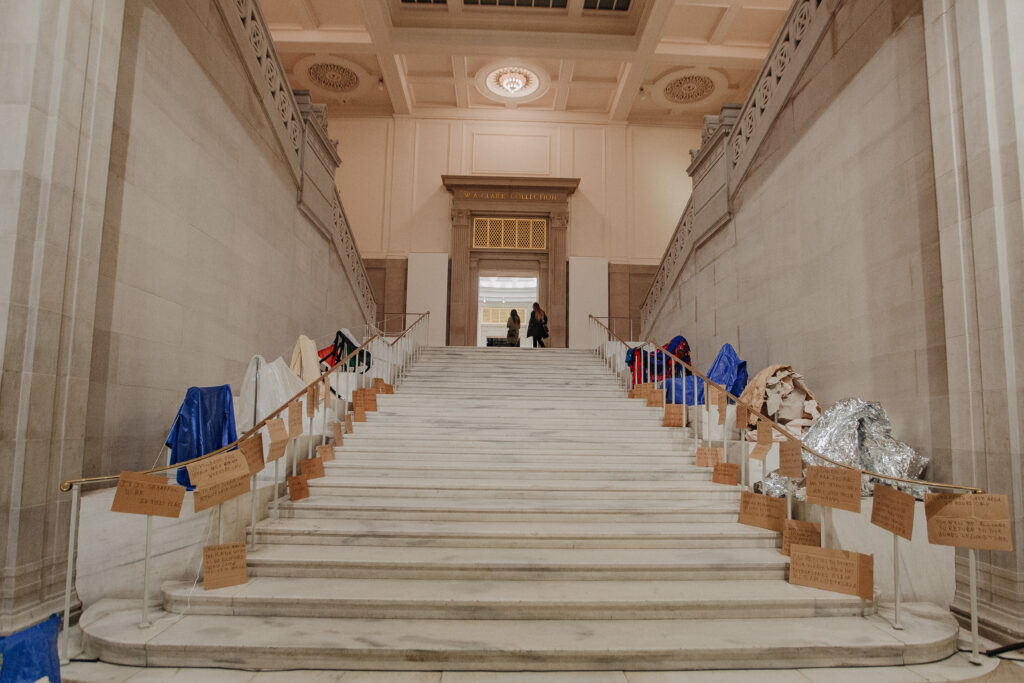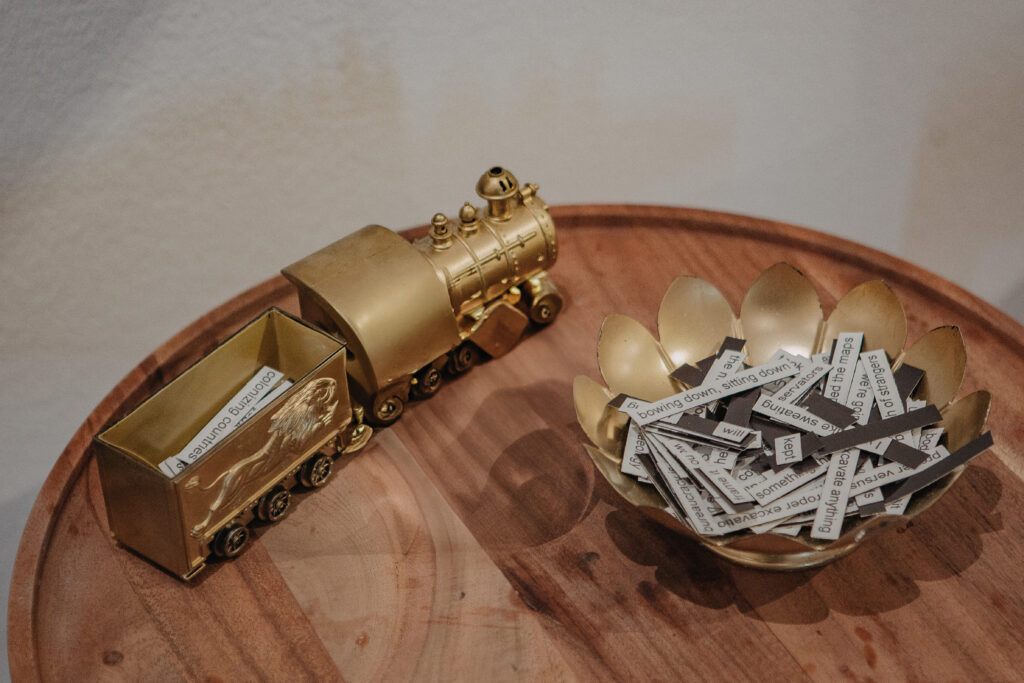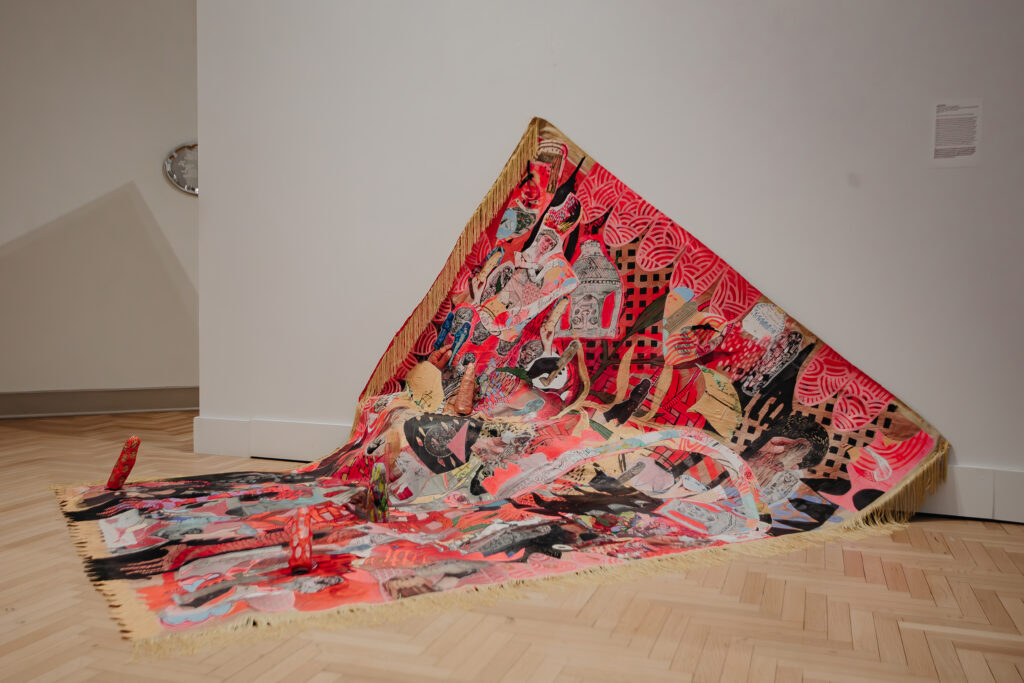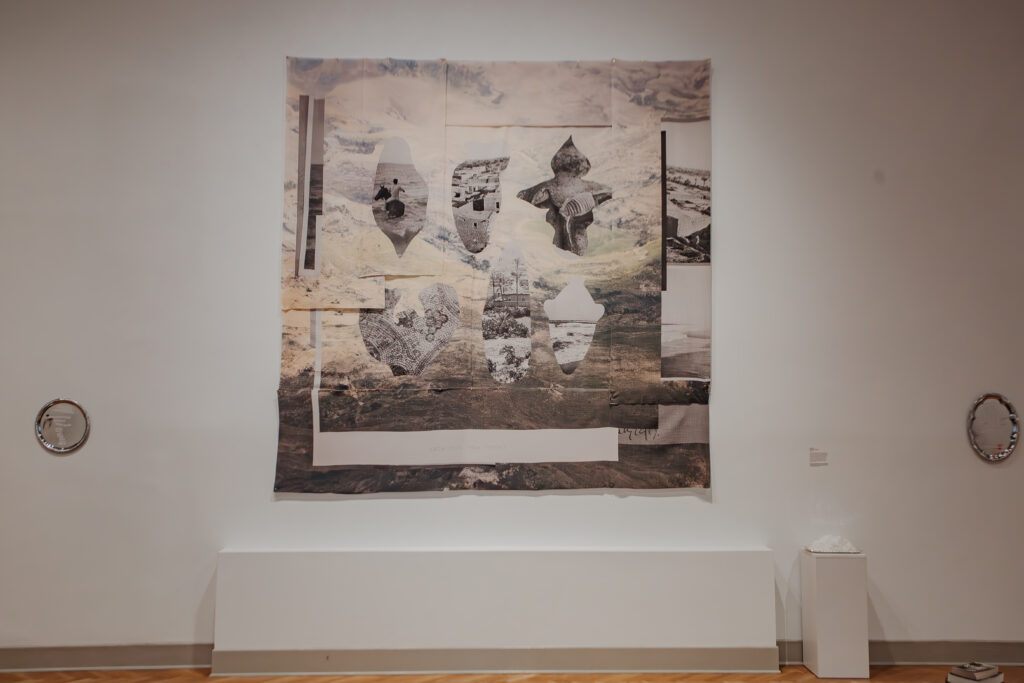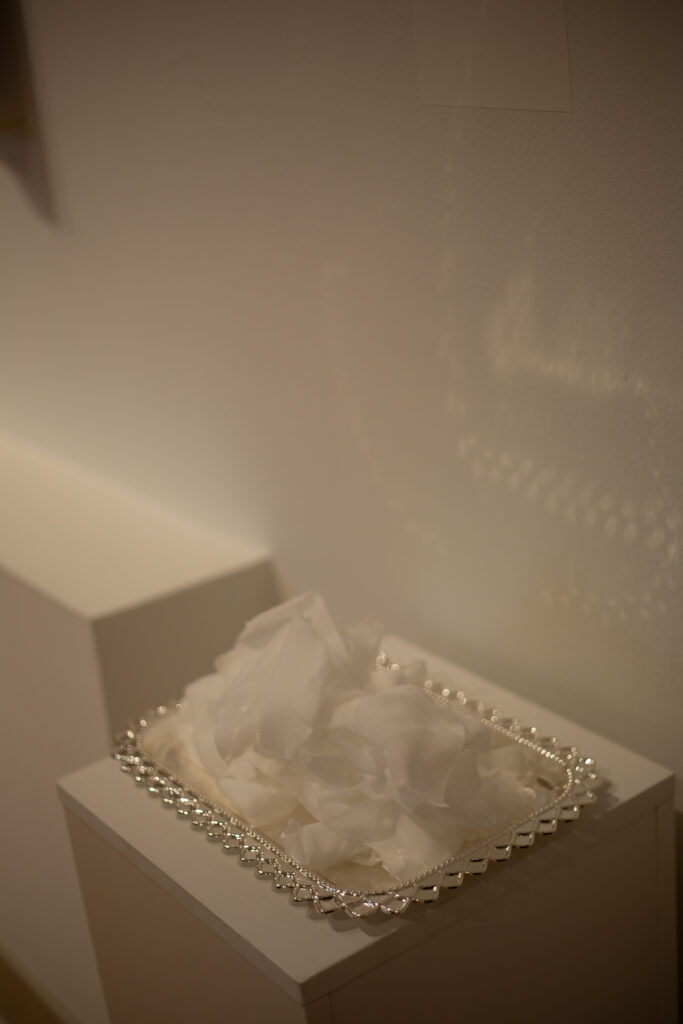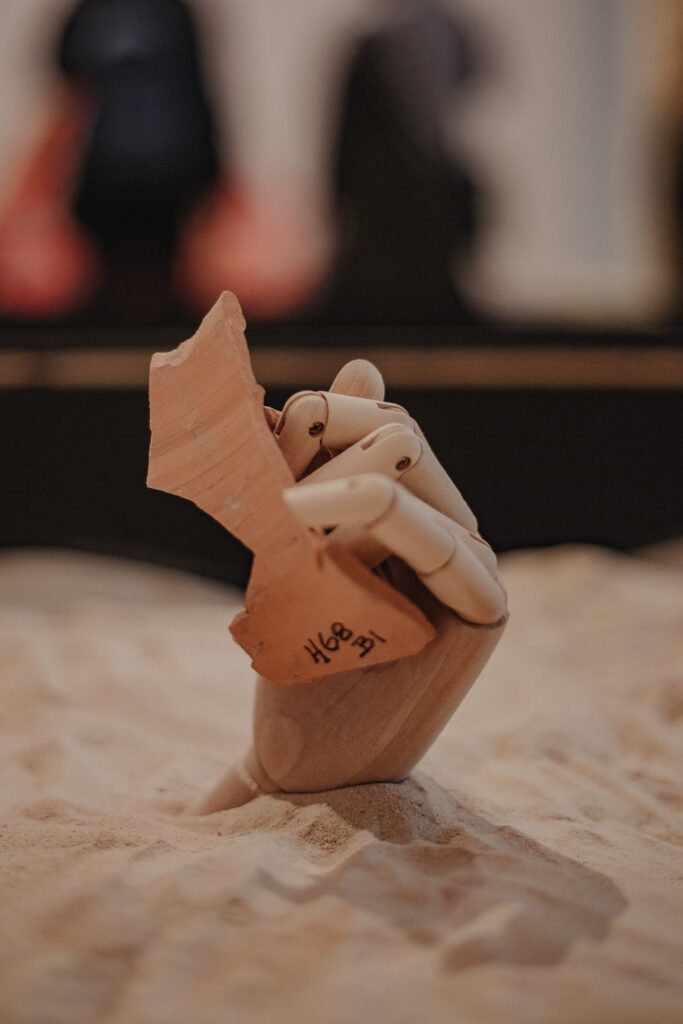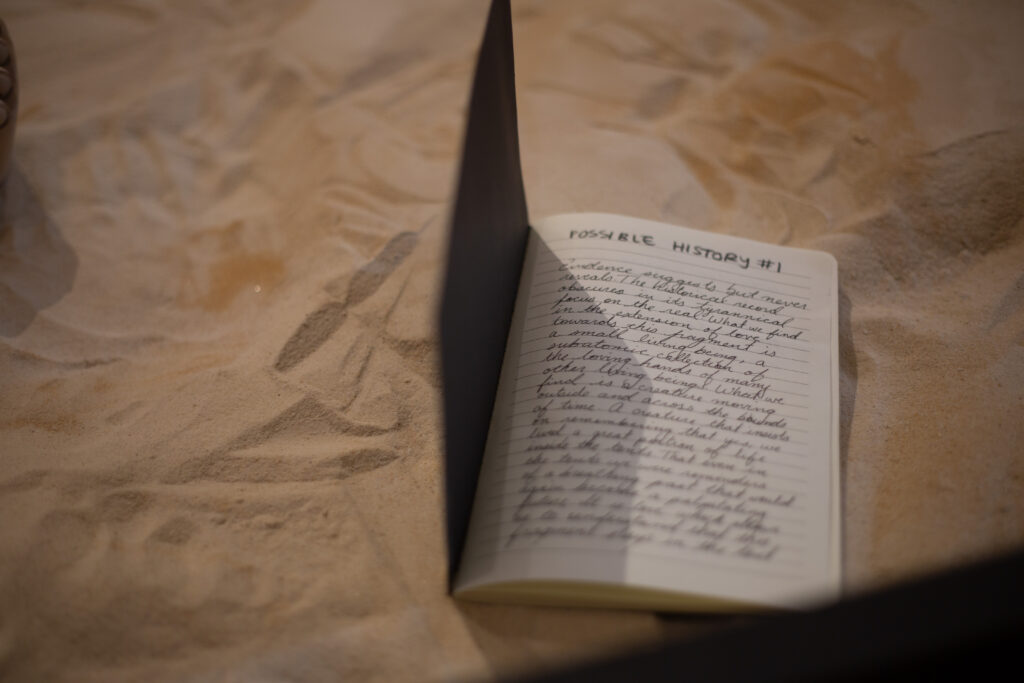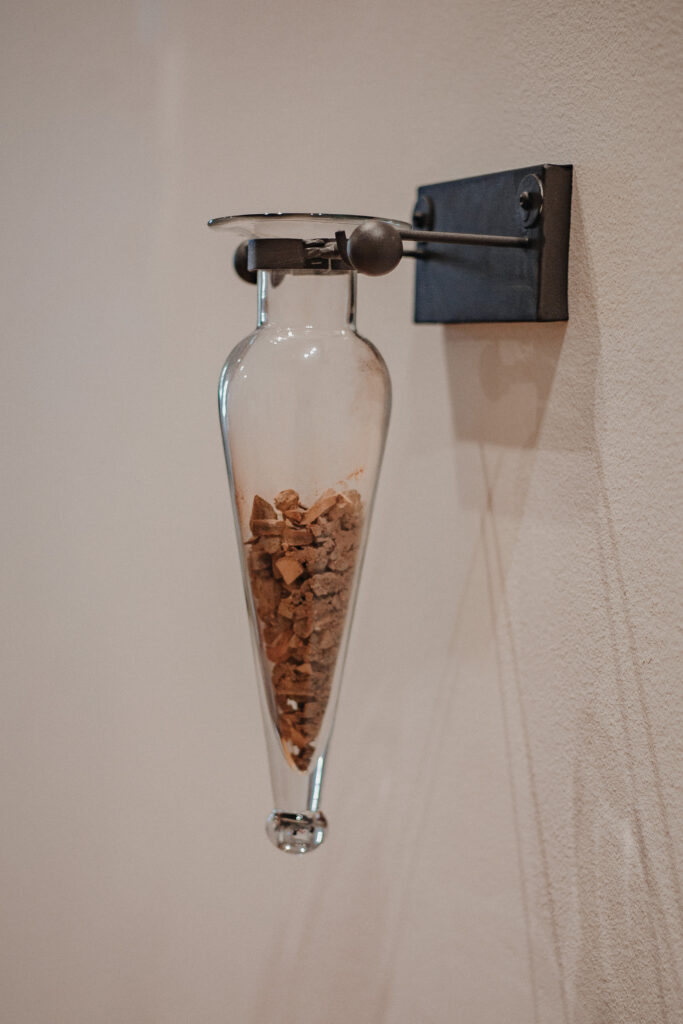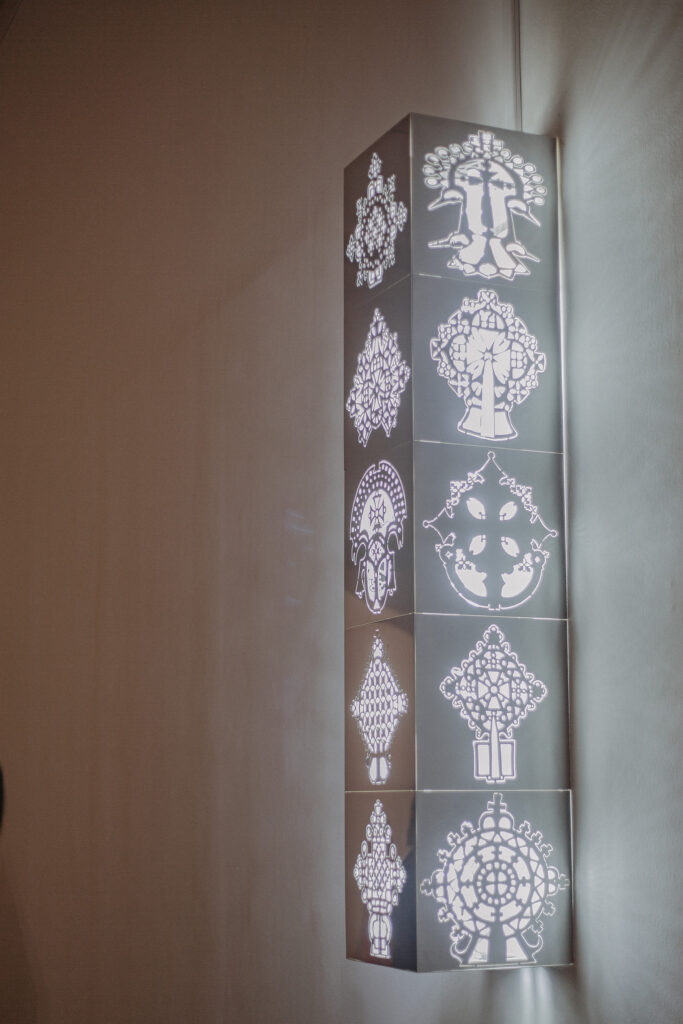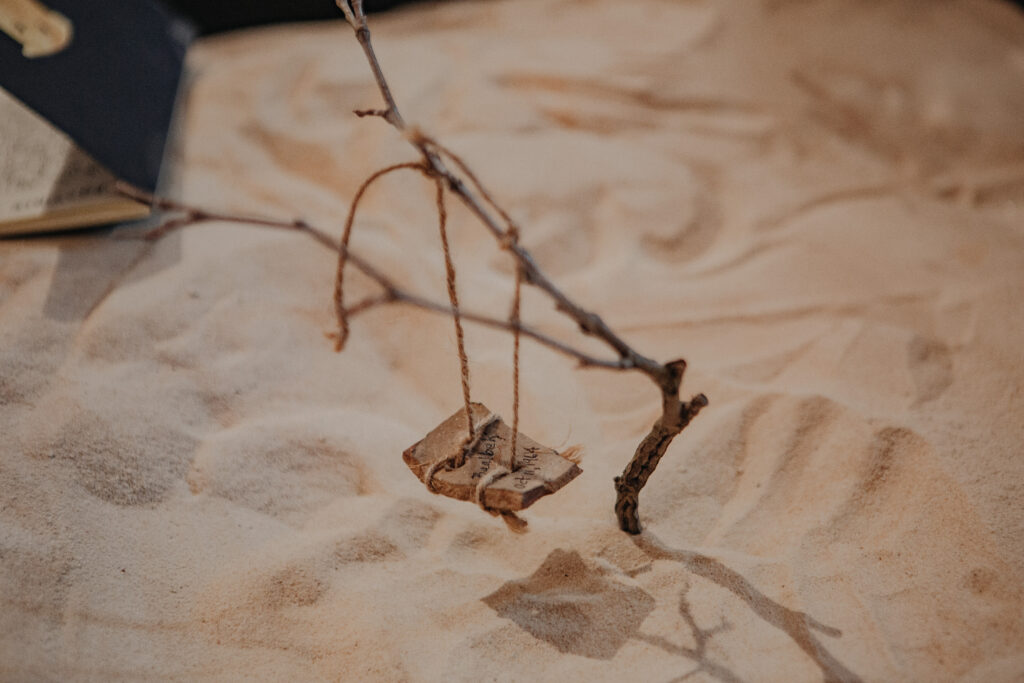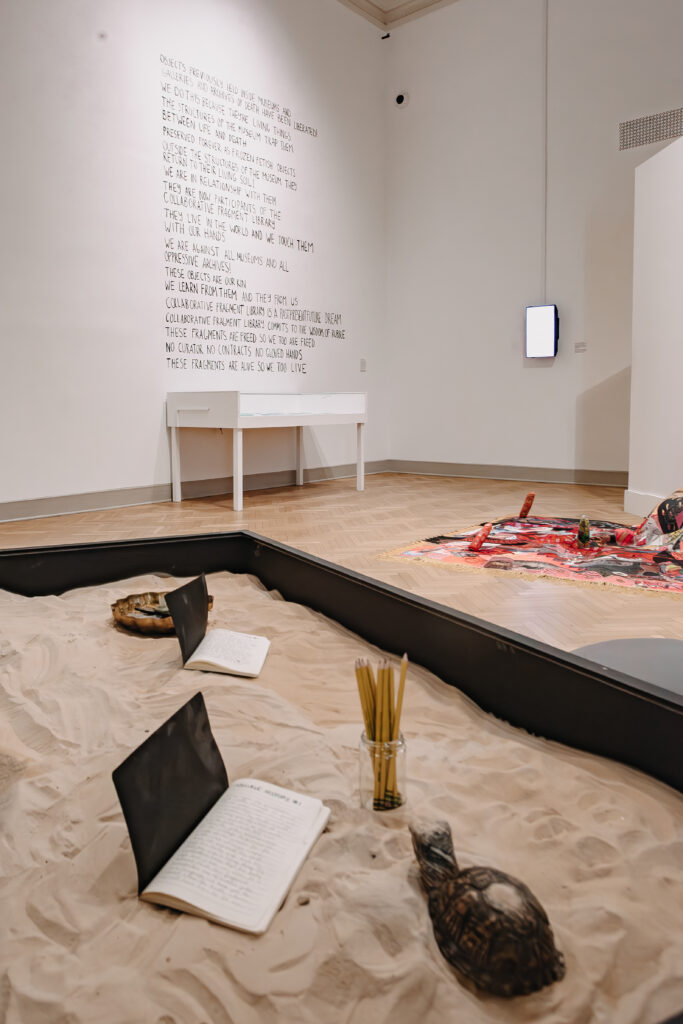Mojdeh Rezaeipour: 93 Fragments
[Featured Project: Exhibition & Programs]
Gallery 1, Flagg Building, GW’s Corcoran School of the Arts & Design, 500 17th St NW, Washington, DC 20006
93 Fragments was organized by DC-based artist Mojdeh Rezaeipour (they/she) and hosted by GW’s Corcoran School of the Arts & Design in Gallery 1 at the Flagg Building from November 14, 2024–February 15, 2025. The project included a group exhibition and a series of programs that bring together the creative practices and methodologies of sixteen artists, writers, and thinkers from all over the world who are in direct conversation with materials of cultural heritage. Engaging themes of restitution, reclamation, transmutation, and talismanic connection, 93 Fragments proposes a radical reimagining of stewardship that aims to transform a museum-like showcase of preserved objects and artworks into a space of revolutionary and liberatory potential.
93 Fragments is also a public iteration of research informing The Collaborative Fragment Library (CFL), a counter-institutional framework for working with artifacts, currently co-stewarded by Rezaeipour and Fargo Nissim Tbakhi. The CFL uses a library model (rather than a museum) to destabilize the processes of colonial extraction and fetishization of materials of cultural heritage, seeking to build alternative models of engagement that think differently about the past and enable these artifacts to continue living.
Visitors to the exhibition were invited to take off their shoes, sit together, drink tea, and engage with an evolving array of visual artwork, poetry, video, and fragments (material, linguistic, and otherwise) by participants in the project. This included installations and visual artworks by The Collaborative Fragment Library, Saj Issa, Tsedaye Makonnen, Jackie Milad, Amanda Phingbodhipakkiya, and Dima Srouji.
Free public programs included a screening of Sophia Al-Maria’s film The Future Was Desert followed by a sound bath led by artist Naoco Wowsugi (February 15, 2025) and a conversation with sociologist Dr. Cresa Pugh (March 1, 2025). Students at GW’s Corcoran School of the Arts & Design also participated in the project with Rezaeipour through courses taught by Clement Akpang, whose research interests include decolonization of museology and new expressions of resistance in contemporary African art.
Additional contributors include Ibrahim Ahmed, Jeiran Jahani, Solmaz Sharif, Nyugen E. Smith, and Jessica Valoris who are all conversation partners in the development of this project.
93 Fragments began on Thursday, November 14, 2024 with an Opening Reception featuring performances by Tsedaye Makonnen and Fargo Nissim Tbakhi.
Learn more about visiting 93 Fragments, public programs, and participants below.
93 Fragments: Public Hours
93 Fragments took place November 14, 2024–February 15, 2025 at Gallery 1 in the Flagg Building at GW’s Corcoran School of the Arts & Design, 500 17th St NW, Washington, DC 20006.
93 Fragments: Public Programs
Thursday, November 14, 2024 from 6:30–9pm: Opening Reception featuring performances by artists Tsedaye Makonnen and Fargo Nissim Tbakhi starting at 7pm.
Saturday, February 15, 2025 from 4–5pm: Film Screening of The Future Was Desert Parts I and II (2016) by Sophia Al-Maria and sound bath led by Naoco Wowsugi.
Saturday, March 1, 2025 from 12–1:30pm (Zoom): Conversation with sociologist Dr. Cresa Pugh on violent legacies of artifact looting, storytelling as a tool for resistance, and contemporary movements for restitution.
All programs were free and will take place in the Flagg Building at GW’s Corcoran School of the Arts & Design unless otherwise noted.
93 Fragments: Participants
Ibrahim Ahmed is a Kuwait-born artist currently based in Giza, Egypt. He works in photography, sculpture, and installation, engaging with subjects related to colonial legacies, structures of power, cultural hybridity, and fluid identity. His practice generates discussion around ideas of the self beyond parameters of the nation-state.
Sophia Al-Maria is a Qatari-American artist, writer, and filmmaker living and working in London. Her work spans many disciplines including drawing, collage, sculpture, and film, and is united by a preoccupation with the power of storytelling and myth, and in particular with imagining counter-histories and alternative futures. Al-Maria’s debut exhibition in the United States at the Whitney Museum of Art in 2016 attended to the Persian Gulf’s embrace of consumerism.
The Collaborative Fragment Library is an infrastructure for repurposing ancient artifacts outside of the extractive circulatory economy of museums, private collectors, and colonial histories. Since 2020, Mojdeh Rezaeipour and Fargo Nissim Tbakhi have been imagining with a collection of 93 ancient pottery fragments excavated across thirty sites throughout the SWANA region. These fragments became ‘theirs’ through a process of deaccession via a religious institution that deemed them to have no value. They’ve since gathered dozens of artists with lineages across these sites and invited them into conversations toward a collective intervention. Simultaneously, they’ve spent time alongside archeologists and conservators at various institutions where potsherds are deemed similarly devalued inside underground ‘study collections.’ By using a library model (rather than a museum) to destabilize the processes of colonial extraction and fetishization of these fragments, the CFL seeks to build a sustainable alternative model of engagement that thinks differently about the past and enables these artifacts to continue living.
Helon Habila is a Nigerian author and poet currently teaching at George Mason University in Virginia. His writing and poetry include The Chibok Girls: The Boko Haram Kidnappings and Islamist Militancy in Nigeria (2014), The Granta Book of the African Short Story (2011), Oil on Water (2010), Measuring Time (2007), among others. His writing has won many prizes including the Caine Prize, the Commonwealth Writers Prize for the African region, the Emily Balch Prize, and the Windham-Campbell Prize for Fiction.
Saj Issa is a Palestinian-American artist born in St. Louis and raised between the U.S. and Palestine. Issa was one of three artists selected for the 2024 Great Rivers Biennial, which opened at the Contemporary Art Museum St. Louis in September 2024 and includes the artist’s “Poppy Paintings” which were presented in Artforum along with a portfolio of her practice. She has held residencies at the Belger Crane Yard Studios in Kansas City, MO, and Craft Alliance in St. Louis, MO. She has been featured in interviews with Hyperallergic, Juxtapoz, Khama, New American Paintings, The New Yorker, and Office Magazine.
Jeiran Jahani is a PhD student in the Department of Art History and Archaeology at Columbia University where she is researching the arts of the first cities in ancient Iran and Iraq.
Tsedaye Makonnen is an interdisciplinary artist, curator, and cultural producer. Her practice is driven by Black feminist theory, firsthand site-specific research, and ethical social practice techniques which become solo and collaborative performances, objects, installations, and films. In 2019, Makonnen was a Smithsonian Artist Research Fellow and staged two interventions at the Venice Biennale. In 2021, her light sculptures were acquired by the Smithsonian National Museum of African Art for their permanent collection and she published a book titled Black Women as/and the Living Archive with WPA. In 2022, she performed at the Venice Biennale for Simone Leigh’s Loophole of Retreat and was the Clark Art Institute’s inaugural Futures Fellow.
Jackie Milad is a Baltimore-based artist whose mixed-media abstract paintings and collages address the history and complexities of dispersed cultural heritage and multi-ethnic identity. She has participated in numerous group and solo exhibitions nationally and internationally. In 2019, she was named a Janet & Walter Sondheim Prize Finalist. In 2022, Jackie received the Municipal Art Society of Baltimore City Travel Prize to conduct in-depth research on Egyptian antiquities held at the British Museum and Petrie Museums in London. In 2024, Jackie Milad became a Creative Capital Grantee and the inaugural Robert W. Deutsch Foundation’s Alumni Ruby’s Artist Grantee. She is currently represented by SOCO Gallery in Charlotte, NC and Pentimenti Gallery in Philadelphia, PA.
Cresa Pugh is an assistant professor of sociology at The New School in New York. Her research sits at the intersection of historical transnational sociology, postcolonial social theory, and critical museum studies, with a focus on the cultural, political, and economic implications of colonial-era artifact looting and contemporary movements for restitution. Central to her work is an examination of how cultural artifacts looted during colonial conquest continue to sustain imperial racial capitalism and global racial hierarchies. Pugh’s current book project, Guardians of Beautiful Things: The Politics of Postcolonial Cultural Theft, Restitution, Refusal, and Repair, engages with the contested history of the Benin Bronzes and ongoing struggles over their restitution. In addition to her work on restitution, Dr. Pugh is developing a second book project, Fela Kuti and the Postcolonial African Imagination, which examines anti-colonial and decolonial thought in postcolonial Africa through the life and activism of Nigerian Afrobeat musician Fela Kuti.
Amanda Phingbodhipakkiya is a transdisciplinary artist working across sculpture, textile, painting, and public art. Her practice channels loss and disconnection into portals of renewal and repair. She creates living monuments for audiences to reclaim, rebuild, and restore through participation and communion. Weaving together gifted stories, artifacts, and wisdom, she shapes expansive spaces of softness and wonder where new seeds can take root. Phingbodhipakkiya is a 2024 New York City Artadia Awardee and a 2023 Jerome Hill Artist Fellow in Visual Arts.
Solmaz Sharif is the author of Customs (2022) and Look (2016), a finalist for the National Book Award. She holds degrees from U.C. Berkeley, where she studied and taught with June Jordan’s Poetry for the People, and New York University. Her work has appeared in Harper’s, The Paris Review, Poetry, The Kenyon Review, The New York Times, and others. Her work has been recognized with a “Discovery”/Boston Review Poetry Prize, Rona Jaffe Foundation Writers’ Award, and Holmes National Poetry Prize from Princeton University. She has received fellowships from the National Endowment for the Arts, Lannan Foundation, and Stanford University. She is currently an Associate Professor of English and Shirley Shenker Chair of Arts and Humanities at U.C. Berkeley.
Nyugen E. Smith is an artist living and working in Jersey City. His practice revolves around the construction of narrative through the prism of Black cultural identity. The manifold ramifications of European colonialism across the African Diaspora serve as the foundation upon which his practice is constructed. Central to his practice is an emphasis on the utilization of pre-existing materials, the body, and play, within the art-making process. Smith’s work has been presented at the Museum of Latin American Art, Peréz Art Museum, Museum of Cultural History, Norway, Frist Art Museum, Blanton Museum, Newark Museum, and the Schomburg Center for Research in Black Culture, Museum of Fine Arts, Houston, among others. Nyugen is the recipient of the Creative Capital Award, Leonore Annenberg Performing and Visual Arts Fund, Franklin Furnace Fund, Dr. Doris Derby Award, New Jersey State Council on the Arts grant, and Joan Mitchell Foundation Painters and Sculptors Grant.
Dima Srouji is an architect and visual artist exploring the ground as a deep space of rich cultural weight and a space for potential collective repair. Srouji looks for ruptures in the ground where imaginary liberation is possible. She works with glass, text, archives, maps, plaster casts, and film, understanding each as an evocative object and emotional companion that help her question what cultural heritage and public space mean in the context of the Middle East, especially in Palestine. Her projects are developed closely with archaeologists, anthropologists, sound designers, and glassblowers. She is currently leading studio Underground Palestine in MA City Design at the Royal College of Art in London. She has exhibited works at the 60th Venice Art Biennale, Sharjah Art Biennial 15, Lagos Biennial 2024, Sharjah Architecture Triennial 2019, the first Islamic Art Biennale 2023, the first Doha Design Biennale, and others.
Fargo Nissim Tbakhi is a Palestinian performance artist. He is calling on you to join with the revolutionary masses across the globe in fighting for the survival and liberation of Palestinians and all oppressed people. We are bound up with one another. Anywhere and everywhere you are, you can get in the way of the death machine; hold somebody’s hand tight and get in the way together. Revolution until victory for all of us.
Jessica Valoris is an interdisciplinary artist and community facilitator based in DC. She weaves together mixed media painting, installation, ritual performance, and social practice, to create sacred spaces. Inspired by the earth-based traditions of her Black American and Jewish ancestry, Valoris engages metaphysics, spirituality, and Afrofuturism in her work. Her art is both balm and blueprint: mapping out pathways for the Black liberatory imagination and reviving recipes for collective care. Valoris is currently a Culture and Narrative Fellow with The Opportunity Agenda and a recipient of the Washington Award from S&R Evermay. Iterations of her recent body of work, Black Fugitive Folklore, have been shown at the Phillips Collection, The Kreeger Museum, Africana Film Festival, The REACH at the Kennedy Center, VisArts, and Brentwood Arts Exchange.
Naoco Wowsugi is a community-engaged artist who lives and works in DC. Wowsugi’s cross-disciplinary projects range from portrait photography, participatory performance, and collective healing, to horticulture, exploring the nature of belonging and inclusive community building while they highlight and fortify everyday communal and interpersonal identities. Wowsugi’s art practice blurs the lines between being an artist and an engaged citizen.
About the Organizer
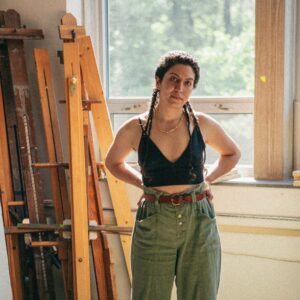
Mojdeh Rezaeipour is an Iranian-born transdisciplinary artist and filmmaker. Rezaeipour’s archive-based, iterative practice bridges over a decade of their varied backgrounds as an architect, storyteller, and community organizer. Their solo and collaborative projects have been exhibited nationally and internationally in a wide range of venues from DIY project spaces to larger institutions and platforms. In 2024, Rezaeipour was an Artist-in-Residence at The Luminary (St. Louis, MO), debuted their solo exhibition Notebooks at Henry Luce III Center for the Arts and Religion (Washington, DC), and shared an inaugural iteration of Classroom Solidarities at the student-run Herman Maril Gallery at University of Maryland (College Park, MD).
Photo by Senna Ahmad
Supporters
WPA’s work, including 93 Fragments, is made possible with support by the DC Commission on the Arts and Humanities, which receives support from the National Endowment for the Arts; The Andy Warhol Foundation for the Visual Arts; The Morris & Gwendolyn Cafritz Foundation; Hickok Cole; National Endowment for the Arts; William S. Paley Foundation; Squire Patton Boggs; MetLife Investment Management; Norges Bank Investment Management; DAVIS Construction; and many other generous foundations, corporations, and individuals.
Special thanks to GW’s Corcoran School of the Arts & Design for hosting this project.

